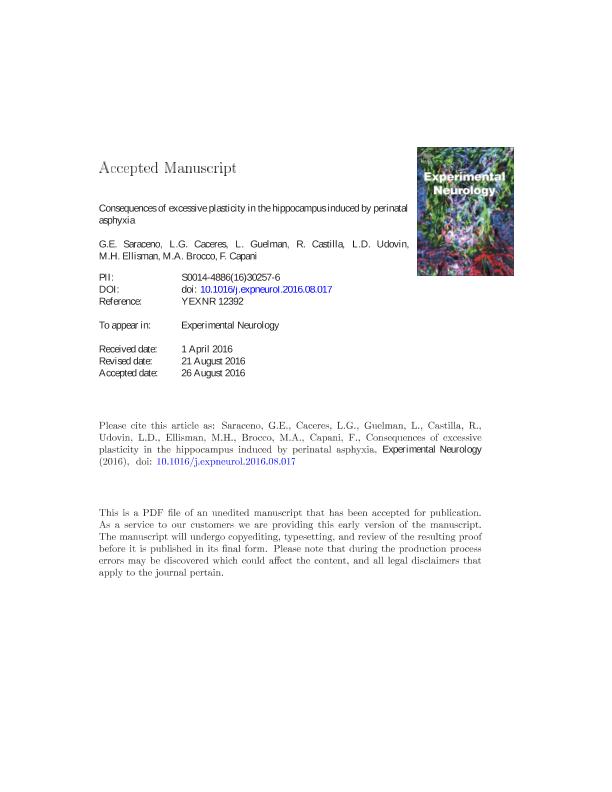Artículo
Consequences of excessive plasticity in the hippocampus induced by perinatal asphyxia
Saraceno, Gustavo Ezequiel ; Cáceres, Lucila Guadalupe
; Cáceres, Lucila Guadalupe ; Guelman, Laura Ruth
; Guelman, Laura Ruth ; Castilla, Rocio Soledad; Udovin, Lucas
; Castilla, Rocio Soledad; Udovin, Lucas ; Ellisman, M. H.; Brocco, Marcela Adriana
; Ellisman, M. H.; Brocco, Marcela Adriana ; Capani, Francisco
; Capani, Francisco
 ; Cáceres, Lucila Guadalupe
; Cáceres, Lucila Guadalupe ; Guelman, Laura Ruth
; Guelman, Laura Ruth ; Castilla, Rocio Soledad; Udovin, Lucas
; Castilla, Rocio Soledad; Udovin, Lucas ; Ellisman, M. H.; Brocco, Marcela Adriana
; Ellisman, M. H.; Brocco, Marcela Adriana ; Capani, Francisco
; Capani, Francisco
Fecha de publicación:
12/2016
Editorial:
Academic Press Inc Elsevier Science
Revista:
Experimental Neurology
ISSN:
0014-4886
Idioma:
Inglés
Tipo de recurso:
Artículo publicado
Clasificación temática:
Resumen
Perinatal asphyxia (PA) is one of the most frequent risk factors for several neurodevelopmental disorders (NDDs) of presumed multifactorial etiology. Dysfunction of neuronal connectivity is thought to play a central role in the pathophysiology of NDDs. Because underlying causes of some NDDs begin before/during birth, we asked whether this clinical condition might affect accurate establishment of neural circuits in the hippocampus as a consequence of disturbed brain plasticity. We used a murine model that mimics the pathophysiological processes of perinatal asphyxia. Histological analyses of neurons (NeuN), dendrites (MAP-2), neurofilaments (NF-M/Hp) and correlative electron microscopy studies of dendritic spines were performed in Stratum radiatum of the hippocampal CA1 area after postnatal ontogenesis. Protein and mRNA analyses were achieved by Western blot and RT-qPCR. Behavioral tests were also carried out. NeuN abnormal staining and spine density were increased. RT-qPCR assays revealed a β-actin mRNA over-expression, while Western blot analysis showed higher β-actin protein levels in synaptosomal fractions in experimental group. M6a expression, protein involved in filopodium formation and synaptogenesis, was also increased. Furthermore, we found that PI3K/Akt/GSK3 pathway signaling, which is involved in synaptogenesis, was activated. Moreover, asphyctic animals showed habituation memory changes in the open field test. Our results suggest that abnormal synaptogenesis induced by PA as a consequence of excessive brain plasticity during brain development may contribute to the etiology of the NDDs. Consequences of this altered synaptic maturation can underlie some of the later behavioral deficits observed in NDDs.
Archivos asociados
Licencia
Identificadores
Colecciones
Articulos(SEDE CENTRAL)
Articulos de SEDE CENTRAL
Articulos de SEDE CENTRAL
Citación
Saraceno, Gustavo Ezequiel; Cáceres, Lucila Guadalupe; Guelman, Laura Ruth; Castilla, Rocio Soledad; Udovin, Lucas; et al.; Consequences of excessive plasticity in the hippocampus induced by perinatal asphyxia; Academic Press Inc Elsevier Science; Experimental Neurology; 286; 12-2016; 116-123
Compartir
Altmétricas



